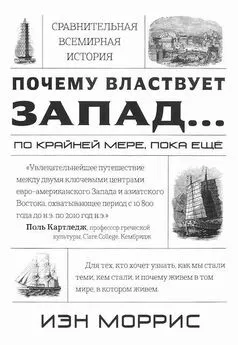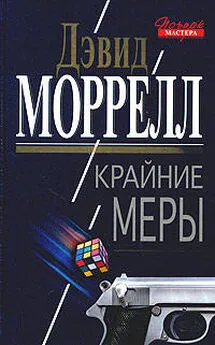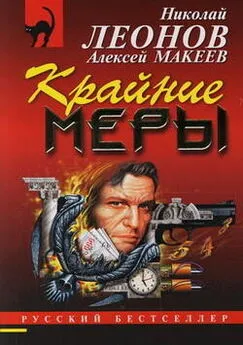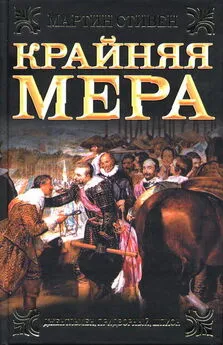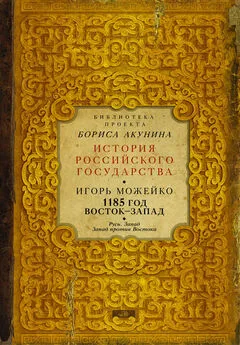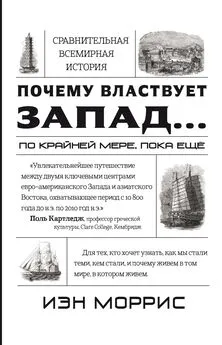Иэн Моррис - Почему властвует Запад... по крайней мере, пока еще
- Название:Почему властвует Запад... по крайней мере, пока еще
- Автор:
- Жанр:
- Издательство:Карьера Пресс
- Год:2016
- Город:Москва
- ISBN:978-5-00074-078-1
- Рейтинг:
- Избранное:Добавить в избранное
-
Отзывы:
-
Ваша оценка:
Иэн Моррис - Почему властвует Запад... по крайней мере, пока еще краткое содержание
Известный историк и археолог, преподаватель Стэнфордского Университета Иэн Моррис рассказывает о 15 тысячелетиях человеческой истории, последние два из которых Запад играет в мире доминирующую роль. Моррис объясняют причину упадка и поражения Востока в историческом соревновании с Западом. Но будет ли властвовать Запад бесконечно? Иэн Моррис предлагает свежий взгляд практически на каждое важное историческое событие. Он описывает закономерности человеческой истории, анализирует события современности и делает прогнозы относительно ситуации в будущем.
Иэн Мэттью Моррис дает неожиданные ответы, подкрепляя их тщательно выверенными фактами, сводя воедино последние результаты исследований в археологии, искусстве, метеорологии, медицине, нейропсихологии, антропологии.
Почему властвует Запад... по крайней мере, пока еще - читать онлайн бесплатно ознакомительный отрывок
Интервал:
Закладка:
Schram, Stuart. The Political Thought of Mao Tse-Tung. New York: Praeger, 1969.
Schwartz, Benjamin. The World of Thought in Ancient China. Cambridge, MA: Harvard University Press, 1985.
Schwartz, Benjamin, ed. Wisdom, Revelation, and Doubt: Perspectives on the First Millennium BC. Special edition of Daedalus, spring 1975.
Schwartz, Glenn, ed. After Collapse. Tucson: University of Arizona Press, 2006.
Service, Elman. Primitive Social Organization. 1st ed. New York: Random House, 1962.
Shang, Hong, et al. “An Early Modern Human Tooth from Tianyuan Cave, Zhoukoudian, China.” Proceedings of the National Academy of Sciences 104 (2007), pp. 6573-78.
Shankman, Steven, and Stephen Durant, eds. The Siren and the Sage: Knowledge and Wisdom in Ancient Greece and China. London: Cassell, 2000.
Shanks, Michael, and Christopher Tilley. Social Theory and Archaeology. Cambridge: Polity Press, 1987.
Shapin, Steve. 1994. A Social History of Truth: Credibility and Science in Seventeenth-Century England. Chicago: University of Chicago Press, 1994.
---. The Scientific Revolution. Chicago: University of Chicago Press, 1996.
Shapiro, Judith. Mao’s War Against Nature: Politics and the Environment in Revolutionary China. Cambridge, UK: Cambridge University Press, 2001.
Shaughnessy, Edward. “Historical Perspectives on the Introduction of the Chariot into China.” Harvard Journal of Asiatic Studies 48 (1988), pp. 189-237.
---. Sources of Western Zhou History: Inscribed Bronze Vessels. Berkeley: University of California Press, 1991.
---. Before Confucius: Studies in the Creation of the Chinese Classics. Albany: State University of New York Press, 1997.
Shaw, Brent. “Seasons of Death: Aspects of Mortality in Imperial Rome.” Journal of Roman Studies 86 (1996), pp. 100-138.
Sheehan, James. Where Have All the Soldiers Gone? Boston: Houghton Mifflin, 2008.
Shelmerdine, Cynthia, ed. The Cambridge Companion to the Aegean Bronze Age. Cambridge, UK: Cambridge University Press, 2008.
Shen, Guanjen, et al. “U-Series Dating of Liujiang Hominid Site in Guangxi, Southern China.” Journal of Human Evolution 43 (2002), pp. 817-29.
---. “Mass Spectrometric U-Series Dating of Liabin Hominid Site in Guangxi, Southern China.” Journal of Archaeological Science 34 (2007), pp. 2109-14.
Shiba, Yoshinobu, and Mark Elvin. Commerce and Society in Sung China. Ann Arbor: University of Michigan Press, 1970.
Shklovskii, Iosif, and Carl Sagan. Intelligent Life in the Universe. San Francisco: Holden-Day, 1966.
Shlaes, Amity. The Forgotten Man: A New History of the Great Depression. New York: HarperCollins, 2007.
Short, Philip. Mao: A Life. New York: Owl Books, 1999.
Sim, May. Remastering Morals with Aristotle and Confucius. Cambridge, UK: Cambridge University Press, 2007.
Simms, Brendan. Three Victories and a Defeat: The Rise and Fall of the First British Empire. New York: Basic Books, 2008.
Sing, Chew. The Recurring Dark Ages. Walnut Creek, CA: AltaMira Press, 2007.
Singer, P. W. Wired for War: The Robotics Revolution and Conflict in the 21st Century. New York: Penguin, 2009.
Sivin, Nathan. “Why the Scientific Revolution Did Not Take Place in China—Or Didn’t It?” Chinese Science 5 (1982), pp. 45-66.
Slicher van Bath, B. H. The Agrarian History ofWestern Europe, AD 500-1850. London: Arnold, 1963.
Smelser, Neil, and Richard Swedberg, eds. The Handbook of Economic Sociology. 2nd ed. New York: Russell Sage Foundation, 2005.
Smil, Vaclav. General Energetics: Energy in the Biosphere and Civilization. New York: Wiley, 1991.
—--. Energy in World History. Boulder, CO: Westview Press, 1994.
---. Creating the Twentieth Century: Technical Innovations of 1867-1914 and Their Lasting Impact. New York: Oxford University Press, 2005.
---. Transforming the Twentieth Century: Technical Innovations and Their Consequences. New York: Oxford University Press, 2006.
---. Global Catastrophes and Trends: The Next Fifty Years. Cambridge, MA: MIT Press, 2008.
---. Why America Is Not a New Rome. Cambridge, MA: MIT Press, 2010.
Smith, Adam. “Writing at Anyang.” Unpublished PhD dissertation, University of California-Los Angeles, 2008.
Smith, Dennis. Japan Since 1945: The Rise of an Economic Superpower. London: St. Martins Press, 1995.
Smith, Grafton Elliot. The Migrations of Early Culture. Manchester, UK: Manchester University Press, 1915.
Smith, Michael. The Aztecs. 2nd ed. Oxford: Blackwell, 2003.
Smith, Paul. Taxing Heavens Storehouse: Bureaucratic Entrepreneurship and the Sichuan Tea and Horse Trade, 1074-1224. Cambridge, MA: Harvard University Press, 1991.
---. “Do We Know as Much as We Need to About the Song Economy? Observations on the Economic Crisis of the Twelfth and Thirteenth Centuries.” Journal of Sung-Yuan Studies 24 (1994), pp. 327-33.
Smith, Paul, and Richard von Glahn, eds. The Song-Yuan-Ming Transition in Chinese History. Cambridge, MA: Harvard University Press, 2003.
Smith, Richard. Chinese Maps: Images of “All Under Heaven.” New York: Oxford University Press, 1996.
Snell, Daniel, ed. A Companion to the Ancient Near East. Oxford: Blackwell, 2007.
So, Jenny. Eastern Zhou Ritual Bronzes from the Arthur M. Sackler Collections. Washington, DC: Smithsonian Institution, 1995.
So, Kwan-wai. Japanese Piracy in Ming China During the 16th Century. East Lansing: Michigan State University Press, 1975.
Spence, Jonathan. Emperor of China: Self-Portrait ofK’ang-hsi. New York: Vintage, 1974.
---. The Memory Palace of Matteo Ricci. New York: Penguin, 1983.
---. The Search for Modern China. New York: Norton, 1990.
---. God’s Chinese Son. New York: Norton, 1996.
Spencer, Herbert. “Progress: Its Law and Cause.” Westminster Review 67 (1857), pp. 445-85.
Stark, Miriam, ed. Archaeology of Asia. Oxford: Blackwell, 2006.
Stathakopoulos, Dionysios. Famine and Pestilence in the Late Roman and Early Byzantine Empire. Burlington, VT: Ashgate, 2004.
Steffens, Lincoln. The Letters of Lincoln Steffens I. New York: Harcourt, Brace, & Co., 1938.
Steinhardt, Paul, and Neil Turok. Endless Universe: Beyond the Big Bang. New York: Broadway Books, 2007.
Stern, Nicholas. The Economics of Climate Change: The Stern Review. Cambridge, UK: Cambridge University Press, 2006. Available at http://www.occ.gov.uk/activities/ stern.htm.
Stevens, Carol. Soldiers on the Steppe: Army Reform and Social Change in Early Modern Russia. DeKalb: Northern Illinois University Press, 1995.
Stevenson, David. Cataclysm: The First World War as Political Tragedy. New York: Basic Books, 2004.
Stewart, Larry. The Rise of Public Science. Cambridge, UK: Cambridge University Press, 1992.
Stigler, Stephen. “Stigler’s Law of Eponymy.” In Thomas Gieryn, ed., Science and Social Structure, pp. 147-57. New York: New York Academy of Sciences, 1980.
Strachan, Hew. The First World War. New York: Penguin, 2005.
Strassberg, Richard. “Trying On Glasses.” In Ronald Pittis and Susan Henders, eds., Macao: Mysterious Decay and Romance, pp. 204-205. Hong Kong: Oxford University Press, 1997.
Strauss, Barry. The Trojan War. New York: Simon and Schuster, 2006.
Struve, Lynn. Voices from the Ming-Qing Cataclysm. New Haven, CT: Yale University Press, 1993.
---, ed. The Qing Formation in World-Historical Time. Cambridge, MA: Harvard University
Press, 2004.
Subrahmanyam, Sanjay. “The Birth-Pangs of Portuguese Asia: Revisiting the Fateful ‘Long Decade,' 1498-1509.” Journal of Global History 2 (2007), pp. 261-80.
Sugihara, Kaoru. “The East Asian Path of Economic Development: A Long-Term Perspective.” In Giovanni Arrighi, Takeshi Hamashita, and Mark Seiden, eds., The Resurgence ofEast Asia: 500, 150, and 50 Year Perspectives, pp. 78-123. New York: Rout-ledge, 2003.
Sunstein, Cass. Worst-Case Scenarios. Cambridge, MA: Harvard University Press, 2007.
Swain, Carol, ed. Debating Immigration. Cambridge, UK: Cambridge University Press, 2007.
Swope, Kenneth. “Crouching Tigers, Secret Weapons: Military Technology Employed During the Sino-Japanese-Korean War, 1592-1598.” Journal of Military History 69 (2005), pp. 11-42.
---. A Dragons Head and a Serpents Tail: Ming China and the First Great East Asian War, 1592-1598. Norman: University of Oklahoma Press, 2009.
Sypeck, Jeff. Becoming Charlemagne: Europe, Baghdad, and the Empires of A.D. 800. New York: Harper, 2006.
Tetlock, Philip, and Aaron Belkin, eds. Counterfactual Thought Experiments in World Politics. Princeton: Princeton University Press, 1996.
Tetlock, Philip, Richard Ned Lebow, and Geoffrey Parker, eds. Unmaking the West: “What-If” Scenarios That Rewrite World History. Ann Arbor: University of Michigan Press, 2006.
Thomas, Chris, et al. “Extinction Risk from Climate Change.” Nature 427 (2004), pp. 145-48.
Thompson, E. P. The Making of the English Working Class. London: Penguin, 1963.
---. Customs in Common: Studies in Traditional Popular Culture. London: Merlin, 1991.
Thomson, R. W. The Armenian History Attributed to Sebeos. Liverpool, UK: Liverpool University Press, 1999.
Thorp, Robert. China in the Early Bronze Age. Philadelphia: University of Pennsylvania Press, 2006.
Tillman, Hoyt, and Stephen West, eds. China Under Jurchen Rule. Albany: State University of New York Press, 1995.
Tilly, Charles. Coercion, Capital, and European States, AD 990-1990. Oxford: Blackwell, 1992.
Tocheri, Matthew, et al. “The Primitive Wrist of Homo floresiensis and Its Implications for Hominin Evolution.” Science 317 (2007), pp. 1743-45.
Toon, O., et al. “Environmental Perturbations Caused by the Impact of Asteroids and Comets.” Review of Geophysics 35 (1997), pp. 41-78.
Tooze, Adam. The Wages of Destruction: The Making and Breaking of the Nazi Economy. New York: Penguin, 2006.
Torr, Dona,ed. Marx on China, 1855-1860: Articles from the “New York Daily Tribune.” London: Lawrence & Wishart, 1951.
Totman, Conrad. Early Modern Japan. Berkeley: University of California Press, 1993.
---. A History of Japan. Oxford: Blackwell, 2000.
Tracy, James, ed. The Rise of Merchant Empires: Long-Distance Trade in the Early Modern World, 1350-1750. Cambridge, UK: Cambridge University Press, 1990.
---, ed. The Political Economy of Merchant Empires. Cambridge, UK: Cambridge University Press, 1991.
---. The Founding of the Dutch Republic: War, Finance, and Politics in Holland, 1572-1588. Oxford: Oxford University Press, 2008.
Trigger, Bruce. A History of Archaeological Thought. 2nd ed. Cambridge, UK: Cambridge University Press, 1995.
---. Sociocultural Evolution. Oxford: Blackwell, 1998.
Trimble, Jennifer. Replicating Women in the Roman Empire. Cambridge, UK: Cambridge University Press, 2009.
Tsai, Shih-shan. Perpetual Happiness: The Ming Emperor Yongle. Seatde: University of Washington Press, 2001.
Tsunoda, Ryusaku, William de Bary, and Donald Keene, trans. Sources of Japanese Tradition. 2 vols. New York: Columbia University Press, 1964.
Tuchmann, Barbara. The Guns of August. London: Macmillan, 1962.
---. A Distant Mirror: The Calamitous Fourteenth Century. New York: Ballantine, 1978.
---. The March of Folly: From Troy to Vietnam. New York: Ballantine, 1984.
Turchin, Peter. “A Theory for Formation of Large Empires.” Journal of Global History 4 (2009), pp. 191-217.
Twain, Mark. Autobiography I. New York: Harper, 1924.
Twitchett, Denis. “Population and Pestilence in Tang China.” In Wolfgang Bauer, ed., Studia Sino-Mongolica: Festschrift fur Herbert Franke, pp. 35-68. Wiesbaden: Harrassowitz Verlag, 1979.
Читать дальшеИнтервал:
Закладка:
